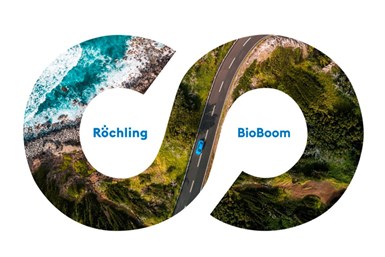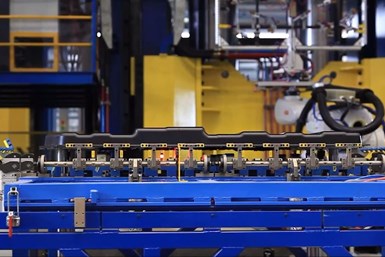Roechling Touts New Bioplastic
Green material generates 90% fewer CO2 emissions than its petroleum-based counterparts
Germany’s Roechling Automotive is taking a greener approach with its products.
To this end, the company has developed a new bioplastic that is made from at least 90% renewable materials, including sugar cane and sugar beet. In the future, Roechling also plans to use cellulose.
The supplier claims the new material is the first patented polylactide (PLA)-based biopolymer in the industry with such a sustainable makeup.
Boom Goes the Plastics
Dubbed BioBoom, the bio-plastic can be used in place of polyester and other petroleum-based PLAs as well as conventional polystyrene (ABS), polyolefins (such as PP) and polyamides (PA6) across a wide variety of components.

Roechling claims 70% fewer greenhouse gas emissions are emitted during the material’s manufacturing process compared with PP. The savings reaches nearly 90% versus PA6.
If BioBoom was used in place of all the petrochemical plastics in an average midsize car, the supplier calculates that CO2 manufacturing emissions could be cut by more than 1,100 lbs per vehicle.
More Benefits
The bioplastic also offers “significant improvements” in thermal stability and chemical resistance over standard PLA, according to the supplier. Other performance properties are said to be the same or better as conventional materials.

(Image: Roechling)
Adding talc, glass or wood fibers allows the material to be used in complex shapes.
Roechling notes that it sources the material from readily available and “reasonably priced” raw materials. Moreover, the company claims, there is “no effect on the food chain, because most of the materials come from production for industrial purposes.”
Initial Applications
BioBoom can be used across most of Roechling’s product portfolio, including underbody, engine compartment and interior components.
The company currently is working on applications for active grille shutters, air intake ducts, cowl grilles, exterior grilles and filter cases.
The company expects to sign its first OEM production contract for the material later this year. Negotiations also are underway with at least one other carmaker, according to the supplier.
What’s Next?
BioBoom is the first in a wave of next-generation environmentally friendly materials that Roechling is planning.
The company aims to be the leading supplier of automotive bio-plastics and other recycling materials by 2035.
“We believe the circular economy will become a reality in the next decade,” says Roechling Automotive CEO Hanns-Peter Knaebel. "With our bioplastics, we are bringing a sustainable solution to the market that originates from a completely self-controlled supply chain—from renewable resources to the automobile manufacturers. We are not waiting for regulations."
RELATED CONTENT
-
TRW Multi-Axis Acceleration Sensors Developed
Admittedly, this appears to be nothing more than a plastic molded part with an inserted bolt-shaped metal component.
-
Choosing the Right Fasteners for Automotive
PennEngineering makes hundreds of different fasteners for the automotive industry with standard and custom products as well as automated assembly solutions. Discover how they’re used and how to select the right one. (Sponsored Content)
-
on lots of electric trucks. . .Grand Highlander. . .atomically analyzing additive. . .geometric designs. . .Dodge Hornet. . .
EVs slowdown. . .Ram’s latest in electricity. . .the Grand Highlander is. . .additive at the atomic level. . .advanced—and retro—designs. . .the Dodge Hornet. . .Rimac in reverse. . .








